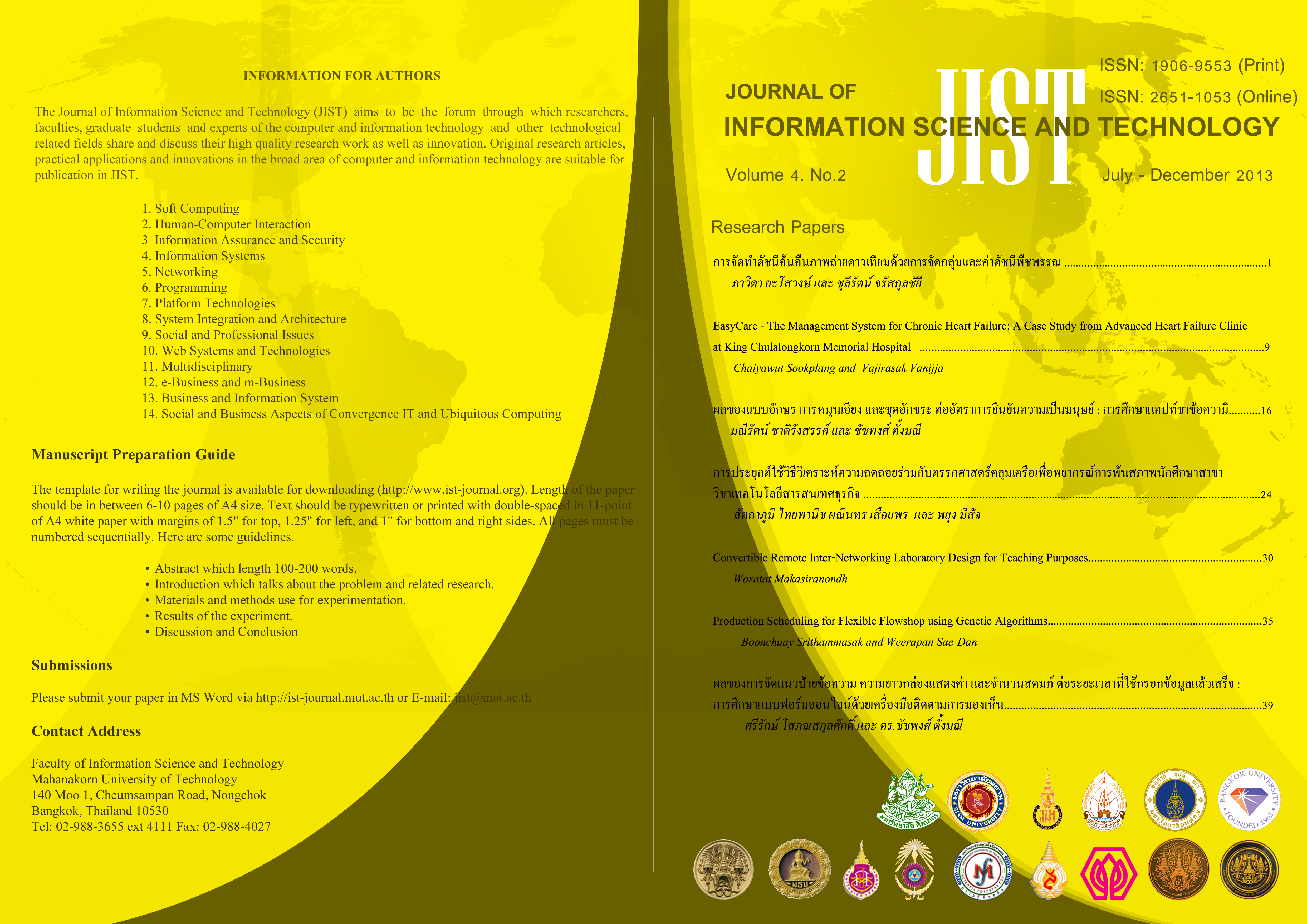Production Scheduling for Flexible Flowshop using Genetic Algorithms
Main Article Content
Abstract
- This paper was to study the production scheduling for the industry enabling to change the product form according to customer’s order. From a variety of products lengthened the process steps and time. The paper studied how to schedule the production table for increasing the efficiency of flexible flow system scheduling. The two state units were experimented. Each unit consisted of unrelated parallel machines. Then, based on the customer’s needs, the flexible flow system production tables were scheduled with the genetic method. The experiment with data characterized by a normal distribution as the number of 20, 50, 80 and 107 jobs was implemented. The results showed that the production scheduling with the genetic method enabled to reduce the production time from 14 days into 12.4 days, or 11.42 percent, and the time analysis of the program processing had the significant relation to the number of the jobs, and the number of the search model.
Article Details
This work is licensed under a Creative Commons Attribution-NonCommercial-NoDerivatives 4.0 International License.
I/we certify that I/we have participated sufficiently in the intellectual content, conception and design of this work or the analysis and interpretation of the data (when applicable), as well as the writing of the manuscript, to take public responsibility for it and have agreed to have my/our name listed as a contributor. I/we believe the manuscript represents valid work. Neither this manuscript nor one with substantially similar content under my/our authorship has been published or is being considered for publication elsewhere, except as described in the covering letter. I/we certify that all the data collected during the study is presented in this manuscript and no data from the study has been or will be published separately. I/we attest that, if requested by the editors, I/we will provide the data/information or will cooperate fully in obtaining and providing the data/information on which the manuscript is based, for examination by the editors or their assignees. Financial interests, direct or indirect, that exist or may be perceived to exist for individual contributors in connection with the content of this paper have been disclosed in the cover letter. Sources of outside support of the project are named in the cover letter.
I/We hereby transfer(s), assign(s), or otherwise convey(s) all copyright ownership, including any and all rights incidental thereto, exclusively to the Journal, in the event that such work is published by the Journal. The Journal shall own the work, including 1) copyright; 2) the right to grant permission to republish the article in whole or in part, with or without fee; 3) the right to produce preprints or reprints and translate into languages other than English for sale or free distribution; and 4) the right to republish the work in a collection of articles in any other mechanical or electronic format.
We give the rights to the corresponding author to make necessary changes as per the request of the journal, do the rest of the correspondence on our behalf and he/she will act as the guarantor for the manuscript on our behalf.
All persons who have made substantial contributions to the work reported in the manuscript, but who are not contributors, are named in the Acknowledgment and have given me/us their written permission to be named. If I/we do not include an Acknowledgment that means I/we have not received substantial contributions from non-contributors and no contributor has been omitted.
References
2. Chae Y. Lee, "Genetic Algorithm for single Machine Job Scheduling with Common Due Dateand Symetric Penalties", Journal of the Operation Research Society of Japan, Vol37, No.2June 1994.
3. Fink, A., and Vob, S.,"Soloving the continuous flowshop scheduling problem bymetaheuristics", European Journal of Operation Research 151, 400-414, 2003.
4. Khammuang, K., "A Genetic algorithm for the cell formation problem with routingflexibility", Master thesis, Asian Institute of Technology, Thailand, 2000.
5. Kumar, S. and Harms, R.,“Improving business process for increased operationalefficiency: a case study”, Journal of Manufacturing Technology Management, 15(7), 667-674, 2004.
6. Masato Watanabe, Kenichi Ida and Mitsuo Gen., “A genetic algorithms with modifiedcrossover operator and search area adaptation for the job-shop scheduling problem.” Computers & Industrial Engineering. 48(2005): 743-752.
7. Melanie Mitchell., “An Introduction to Genetic Algorithms", London: MIT Press, 1998.



